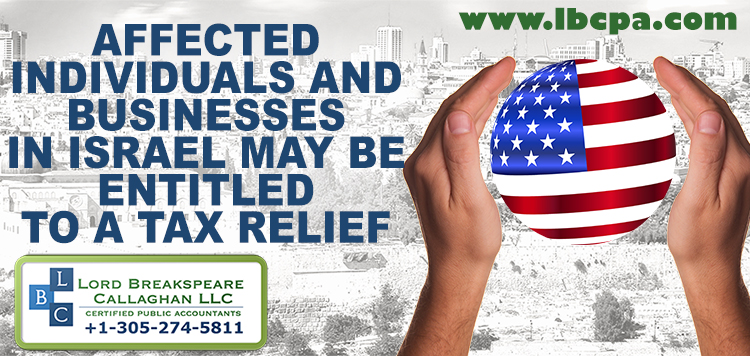LBCPA News 
Click here to go back
Taxpayers Impacted by the Terrorist Attacks in Israel Qualify for Tax Relief: Oct. 16 Deadline, Other Dates Postponed to Oct. 7, 2024

The Internal Revenue Service announced tax relief for individuals and businesses affected by the terrorist attacks in the State of Israel. These taxpayers now have until Oct. 7, 2024, to file various federal returns, make tax payments and perform other time-sensitive tax-related actions.
IRS provided relief to certain taxpayers who, due to the terrorist attacks, may be unable to meet a tax-filing or tax-payment obligation, or may be unable to perform other time-sensitive tax-related actions. The IRS will continue to monitor events and may provide additional relief.
Filing and Payment Relief
This notice postpones various tax filing and payment deadlines that occurred or will occur during the period from Oct. 7, 2023, through Oct. 7, 2024 (postponement period). As a result, affected individuals and businesses will have until Oct. 7, 2024, to file returns and pay any taxes that were originally due during this period. Among other things, this includes:
- Individuals who had a valid extension to file their 2022 return due to run out on Oct. 16, 2023. The IRS noted, however, that because tax payments related to these 2022 returns were due on April 18, 2023, those payments are not eligible for this relief. So, these individuals filing on extension have more time to file, but not to pay.
- Calendar-year corporations whose 2022 extensions run out on Oct. 16, 2023. Similarly, these corporations have more time to file, but not to pay.
- 2023 individual and business returns and payments normally due on March 15 and April 15, 2024. So, these individuals and businesses have both more time to file and more time to pay.
- Quarterly estimated income tax payments normally due on Jan. 16, April 15, June 17 and Sept. 16, 2024.
- Quarterly payroll and excise tax returns normally due on Oct. 31, 2023, and Jan. 31, April 30 and July 31, 2024.
- Calendar-year tax-exempt organizations whose extensions run out on Nov. 15, 2023.
- Retirement plan contributions and rollovers.
In addition, the penalty for failure to make payroll and excise tax deposits due on or after Oct. 7, 2023 and before Nov. 6, 2023, will be abated as long as the deposits are made by Nov. 6, 2023.
Who Qualifies for Relief?
- Any individual whose principal residence or business entity or sole proprietor whose principal place of business is in Israel, the West Bank or Gaza (the covered area).
- Any individual, business or sole proprietor, or estate or trust whose books, records or tax preparer is located in the covered area.
- Anyone killed, injured, or taken hostage due to the terrorist attacks.
- Any individual affiliated with a recognized government or philanthropic organization and who is assisting in the covered area, such as a relief worker.
The IRS automatically identifies taxpayers whose principal residence or principal place of business is located in the covered area based on previously filed returns and applies relief. Other eligible taxpayers can obtain this relief by calling the IRS disaster hotline at 866-562-5227. Alternatively, international callers may call 267-941-1000.
If an affected taxpayer receives a late filing or late payment penalty notice from the IRS for the postponement period, the taxpayer should call the number on the notice to have the penalty abated.
If you have any questions regarding Essential Business Accounting, Domestic Taxation, International Taxation, IRS Representation, U.S. Tax Implications of Real Estate Transactions or Financial Statements, please give us a call at +1-305-274-5811.
Source : IRS






